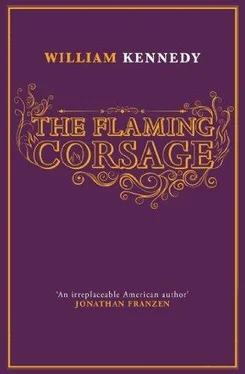“Something stinks,” Petey said.
“Yeah. We don’t need that around here,” Smiler said, and he and Petey crossed the room and sat at a table.
“I’ll have an ale,” Edward said to the bartender, a man he didn’t know, but who obviously took his cue from Smiler.
“One’s all you get,” said the bartender.
Edward let him draw the ale. He picked it up and poured it onto the floor, then let the glass drop and shatter in the puddle.
Now, through the screen door, he saw Jimmy McGrath behind the bar. Four men looked at him when he entered, then went back to their beer. Had he ceased stinking after only a month?
“What’ll it be, Eddie?” Jimmy asked.
“I’ll try an ale. The last glass I had here I never got to drink.”
“I heard about that,” Jimmy said. “And so did Jack. He fired that stupid son of a bitch. ‘Nobody tells Eddie Daugherty he can’t drink in my saloon,’ Jack said.”
Jimmy set an ale in front of Edward, then sat on his stool behind the bar.
“Here’s to Jack,” Edward said, taking a mouthful. “I thought you retired, Jim.”
“I did. Had two toes taken off from the sugar. But I come in nights when Jack needs help. Business is kinda quiet, and I’m next door. Long as I don’t stand up too long.”
“The whole neighborhood’s quiet.”
“Right. But the Tablet Company’s comin’ in up the road. They’re hiring men, and women too, they say.”
“That’ll be good for business.”
Edward took another mouthful of ale.
“Eddie,” said Jimmy, “I’m sorry about the fire, and your wife. They hit you hard.”
“That they did.”
“I remember her coming in after some ale when Emmett was dying. I didn’t serve her first, but she kept at me. She knew what she wanted, that one.”
“You could say that,” Edward said.
“The fire take everything, did it?”
“I saved some journals, inside a trunk in the cellar. They got wet but I can read them. A few books, some silver, odds and ends, a piece of marble. The rest is ashes.”
“How you gonna live now?”
“That’s a hell of a question, Jimmy.”
“People know you’re holed up down there in the house. They see the ice and the food going in. Freddy Doran, the mailman, says the letters he delivers are gone outa the box the next day.”
“I don’t read letters. They’re all about yesterday.”
“We got a letter here for you,” Jimmy said.
He went to the back bar and opened a drawer, handed a letter to Edward.
“Came about a month ago. ‘Hold for pickup,’ it says.”
When Jimmy drew beer for the men down the bar, Edward looked at the letter. Maginn’s hand. He opened it.
Old Chum Edward ,
Missed you at your opening night. If you’re up for a bit of a chat, look me up at 65 Division Street, any time. Always a pleasure to see you.
M
Edward pocketed the letter, finished his ale.
“Another?” Jimmy asked.
“I’ll move along,” Edward said.
“Anything I can do, say the word,” said Jimmy.
“If I ever figure out the word I’ll let you know.”
He walked back to Main Street and climbed the stairs to his workroom. He noted the time, nine-forty-five on the mantel clock, as he picked up the revolver from the desk. He put it in his back pocket and walked down the stairs, feeling the bulk of the pistol, opened the front door and stepped onto the porch. He stared at the long shadows the trees made on Main Street’s bricks, at the sky incandescent with moonlight. The brilliant blackness was suffusing his being like an elixir of resolution. He took the pistol from his pocket and stared at it. He saw Emmett’s finger on the trigger. There is a reason for everything.
He walked into the house and through the hallway to the kitchen, down the back steps and across the yard to Emmett’s toolshed. He found matches and candle and lit them. He saw Emmett’s vise covered with dust. He broke open the pistol and let the six bullets fall onto the workbench. He opened the vise jaws and put the pistol barrel between them, tightened the jaws. He took down a small sledgehammer from its hook and swung, then swung it again, and again, until the pistol broke in three pieces. He opened the vise jaws, tossed the pieces and the bullets into the trash bucket.
Giles, Felicity, and I bring you greetings even so, Maginn.
Edward Goes to the Tenderloin at a Late Hour
DIVISION STREET, FIVE blocks long, ran west from Quay Street on the river, then crossed Broadway, Liberty, Dallius, and Green Streets, which at this hour formed a neighborhood grid thrumming with the revels and lusts of the night city. This was Albany’s Tenderloin, and life was open, the streets full of motion, the Palace Lodging House catering to quick turnover, Scambelluri’s and Marino’s poolrooms, side by side, both busy, Dorgan’s Good Life Saloon, which called itself a concert hall, thriving on music for illegal dancing, for thou shalt not dance in a saloon in Albany. And on the stoops of houses with telltale awnings on their windows (business was so good Jidgie Shea had opened an awning shop on the street), whores of the white race, and one mulata on the stoop of the Creole house, were taking the air this stifling night; and together they formed a tableau of discrete enticements. Youths too poor to buy any of their offerings walked Division Street, hoping for a charitable glimpse of raised thigh, unsequestered breast.
“Come and get it,” one whore said to Edward. “Anything you want you can find right here. You don’t find it, you ain’t lookin’ for it.”
Sixty-five Division Street, a three-story brick dwelling, gave entrance off street level. It adjoined the Good Life, and Edward heard the saloon piano and banjo ringing out a ragtime melody he could put no name to as he rang the bell. A well-shaped woman in her forties, wearing high-necked blouse and long, black skirt, greeted him. Edward flashed that she should have one crossed eye, but she did not.
“You looking for company?” she asked.
“I’m looking for Maginn. Is he here?”
“He’s here,” she said, gesturing for Edward to enter.
“My name is Edward Daugherty.”
“I know who you are.”
“How is that possible?”
“He talks about you.”
Maginn talks about you, of course. He plots to destroy you. Why didn’t you know this the instant Giles blew Felicity into naked infinity? Who profited from that explosion? Yes, the cur Cully was a likely avenger. But when myopia wanes, Maginn, without doubt, emerges as the epiphanic presence at the slaughter. And you, Edward, the true target, you couldn’t see that; you and Maginn such great friends, brothers of the ink stain, comrades of the imagination. Gainsaying fool is what you were. Now here you stand, believing you can goad evil into explaining itself, wondering what the whore of justice looks like, wallowing in your pathetic desire to mean.
“He’s at the bar,” the woman said, and led the way to a large parlor furnished with two sofas and three armchairs of dark red plush, a scatter of Oriental rugs, maroon drapes on the two windows, and lighted by four electrified gas lamps with pale-blue taffeta shades. Music and tobacco smoke came through a half-open door that led to the dance floor of the saloon (Edward could see two women and two men dancing), and at the small bar at the end of the parlor a very young, carrot-haired woman, wearing a blouse that covered little of her large, shapely breasts, was pouring liquor for a man in shirtsleeves who was smoking the butt of a thin cigar. Maginn.
“Ah, Daugherty, you worthless mutt,” Maginn said, “you’re here at last. You look well for a man whose life has been destroyed.”
Читать дальше












